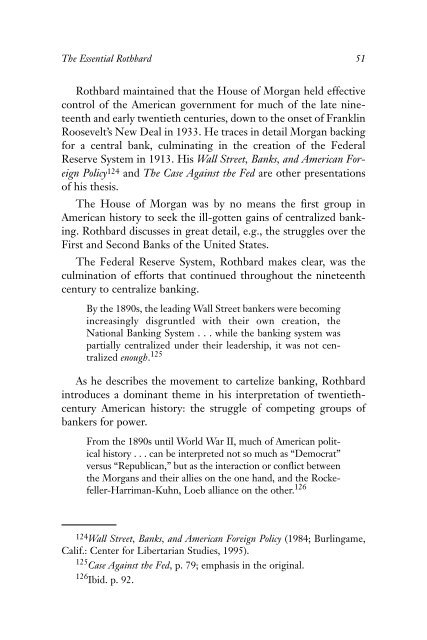The Essential Rothbard - Ludwig von Mises Institute
The Essential Rothbard - Ludwig von Mises Institute
The Essential Rothbard - Ludwig von Mises Institute
Create successful ePaper yourself
Turn your PDF publications into a flip-book with our unique Google optimized e-Paper software.
<strong>The</strong> <strong>Essential</strong> <strong>Rothbard</strong> 51<br />
<strong>Rothbard</strong> maintained that the House of Morgan held effective<br />
control of the American government for much of the late nineteenth<br />
and early twentieth centuries, down to the onset of Franklin<br />
Roosevelt’s New Deal in 1933. He traces in detail Morgan backing<br />
for a central bank, culminating in the creation of the Federal<br />
Reserve System in 1913. His Wall Street, Banks, and American Foreign<br />
Policy124 and <strong>The</strong> Case Against the Fed are other presentations<br />
of his thesis.<br />
<strong>The</strong> House of Morgan was by no means the first group in<br />
American history to seek the ill-gotten gains of centralized banking.<br />
<strong>Rothbard</strong> discusses in great detail, e.g., the struggles over the<br />
First and Second Banks of the United States.<br />
<strong>The</strong> Federal Reserve System, <strong>Rothbard</strong> makes clear, was the<br />
culmination of efforts that continued throughout the nineteenth<br />
century to centralize banking.<br />
By the 1890s, the leading Wall Street bankers were becoming<br />
increasingly disgruntled with their own creation, the<br />
National Banking System . . . while the banking system was<br />
partially centralized under their leadership, it was not centralized<br />
enough. 125<br />
As he describes the movement to cartelize banking, <strong>Rothbard</strong><br />
introduces a dominant theme in his interpretation of twentiethcentury<br />
American history: the struggle of competing groups of<br />
bankers for power.<br />
From the 1890s until World War II, much of American political<br />
history . . . can be interpreted not so much as “Democrat”<br />
versus “Republican,” but as the interaction or conflict between<br />
the Morgans and their allies on the one hand, and the Rockefeller-Harriman-Kuhn,<br />
Loeb alliance on the other. 126<br />
124 Wall Street, Banks, and American Foreign Policy (1984; Burlingame,<br />
Calif.: Center for Libertarian Studies, 1995).<br />
125 Case Against the Fed, p. 79; emphasis in the original.<br />
126 Ibid. p. 92.

















